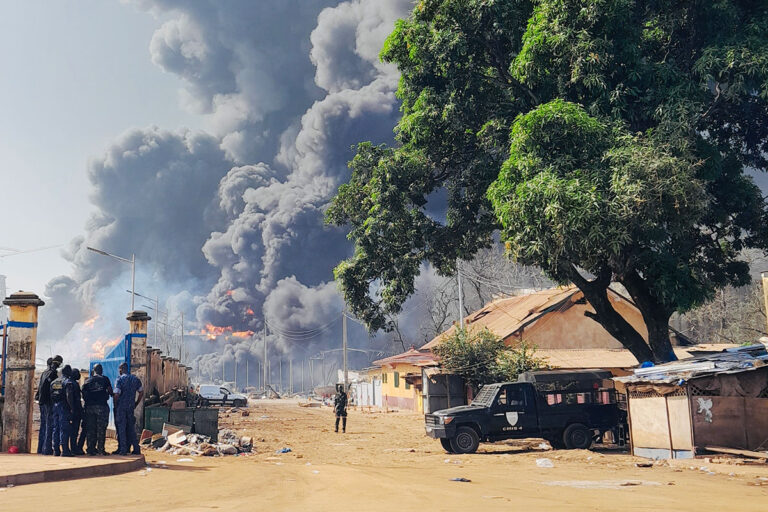The late-night explosion at the Société guinéenne des pétroles (SGP) hydrocarbon depot not only caused tragic loss of life, with at least 24 dead and 454 injured, but also brought economic activity in Conakry to a virtual standstill. Markets such as Madina are deserted, goods transport has ground to a halt, and fishermen are struggling to ply their trade for lack of fuel. This paralysis extended to the port of Conakry, where the usually frenetic activity was replaced by a heavy silence.
National repercussions and government measures
The fuel crisis has repercussions throughout the country. Inter-city transport has been severely affected, with cab and tricycle drivers forced to limit their trips due to fuel rationing. The government imposed strict rationing measures in an attempt to manage the shortage, but this led to a significant increase in transport prices, exacerbating the already precarious economic situation. Demonstrations broke out in several localities, sometimes degenerating into clashes with security forces.
Economic consequences and calls for international aid
The disaster’s impact extended beyond Conakry’s borders, affecting trade and transport nationwide. Shopkeepers and transporters, like Alpha Kabiné Doumbouya, testify to the total immobilization of their activities. Guinea, already faced with poor infrastructure, is seeing its economic situation deteriorate rapidly. Neighboring countries such as Sierra Leone and Côte d’Ivoire are providing support by allowing the use of their depots and supplying fuel. Côte d’Ivoire has pledged to deliver 50 million liters of gasoline per month to Guinea, a crucial aid given that Guinea needs 70 million liters of gasoline per month.
Economic outlook and galloping inflation
Guinean economist Tidiane Barry underlines the risks of a major economic slowdown, with transport fares set to rise by over 60% and inflation projected to exceed 10% by December 2023. This inflation, already palpable in Conakry’s markets, weighs heavily on the population, with direct consequences on purchasing power. Prices for basic necessities are soaring, making daily life increasingly difficult for ordinary citizens. Testimonies from people like Hawa Touré and Aminata Camara at Taouyah market illustrate the profound impact of this crisis on small traders and consumers alike. The current situation highlights the structural weaknesses of the Guinean economy and the urgent need for economic reform.
This disaster represents a critical turning point for Guinea. It not only exposes the vulnerabilities of the national economy, but also offers an opportunity to rethink the country’s economic strategy. Investing in secure infrastructure, diversifying the economy and strengthening regional cooperation are key steps towards sustainable and resilient economic development. The current crisis could be the catalyst for significant change, pushing Guinea towards a more stable and prosperous future.





















